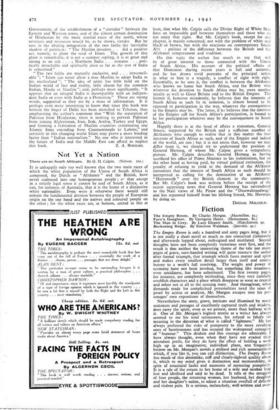What is Pakistan ?
Thoughts on Pakistan does not, as its title suggests, attempt to pronounce a decision or even express a view. It is, in fact, a report made by a remarkable man to a small political organisa- tion mainly Hindu, in Bombay. Its author, Dr. Ambedkar, is, as leader of the fintouchables extremely sensitive about the domination of the higher-caste Iindus—and therefore very much alive to the problem of minorities—without having any particular sympathy for Muslim aspirations. He is, in fact, ideally suited to the task which he has performed, and I would recommend his treatise to all those who wish to understand the fundamental problem of India. Let them not cavil too much at misprints, faulty English and the fact that the book tends to fall between the two stools of " readable " (as the author desires) and " report " fas he states in his prologue). . It is not, in fact, very readable, and it is not quite a reference-book ; nevertheless it is a useful pioneer effort to collect all the information available on a subject of considerable importance. 'The establishment of Pakistan would mean, according to the 5940 resolution of the Muslim League, that " the areas in which the Muslims are numerically in a majority, as in the North-Western and Eastern zones of India should be grouped to constitute independent States." The resolution is vague, in fact ; and Dr. Ambedlcar's chief aims have been to examine (a)" the historical and racial causes underlying the proposal, and (b) the practical difficulties, disadvantages and advantages of its operation. His conclusions point to its inevitability, though he gracefully skips some of the more prickly obstacles—the question, for instance, of a Central
Government, of the establishment of a " corridor " between the Eastern and Western zones, and of the almost certain domination of Hindustan by the more martial races of the north, whose revenues and resources would be, as he shows, slender But he sees in the abiding antagonism of the two faiths the inevitable shadow of partition : " The Muslim invaders . . did a positive act, namely, to plant the seed of Islam. The growth of this plant is remarkable, it is not a summer sapling, it is as great and strong as an oak . . . ; Northern India . . . remains . . . poli- tically detachable and spiritually alien as far as the rest of India is concerned."
" The two faiths are mutually exclusive, and . . irreconcil- able "; " Islam can never allow a true Muslim to adopt India as his motherland "; " The idea of unity has little hold on the Indian world of fact and reality, little charm for the common Indian, Hindu or Muslim "; and, perhaps most significantly, " It appears that an integral India is incompatible with an indepen-. dent India or even with India as a Dominion." These are strong words, supported as they are by a mass of information. It is perhaps even more interesting to know that since this book was written the finger of Delhi has been stretched to Teheran, thus emphasising the author's comment that " With the separation of Pakistan from Hindustan, there is nothing to prevent Pakistan from joining Afghanistan, Iran, Irak, Arabia, Turkey and Egypt, and forming a federation of Muslim countries constituting one Islamic State extending from Constantinople to Lahore," and certainly in this changing world Islam may prove a more binding factor than " Indian nationalism." No one who is interested in the future of India and the Middle East can afford to neglect























 Previous page
Previous page